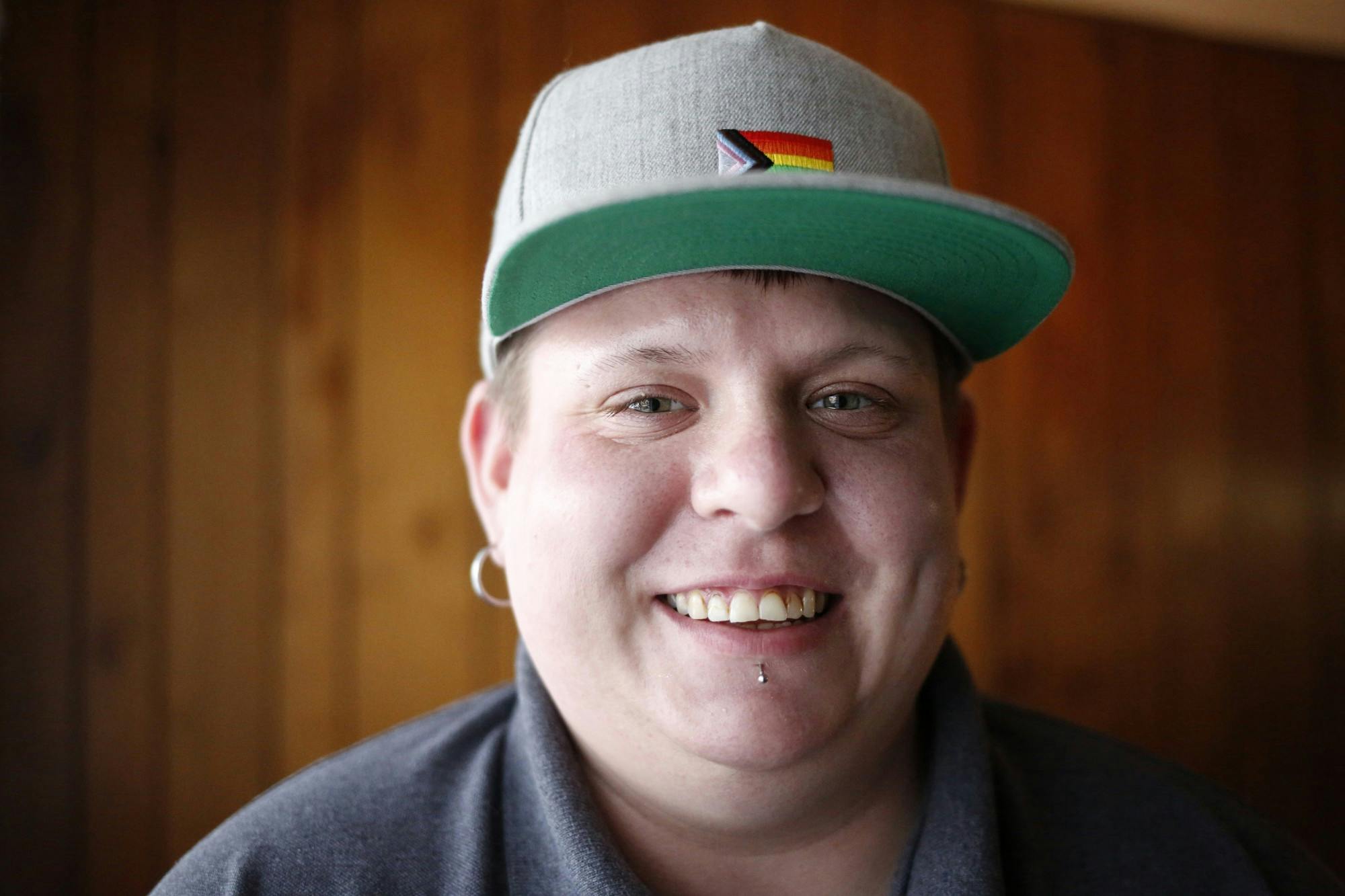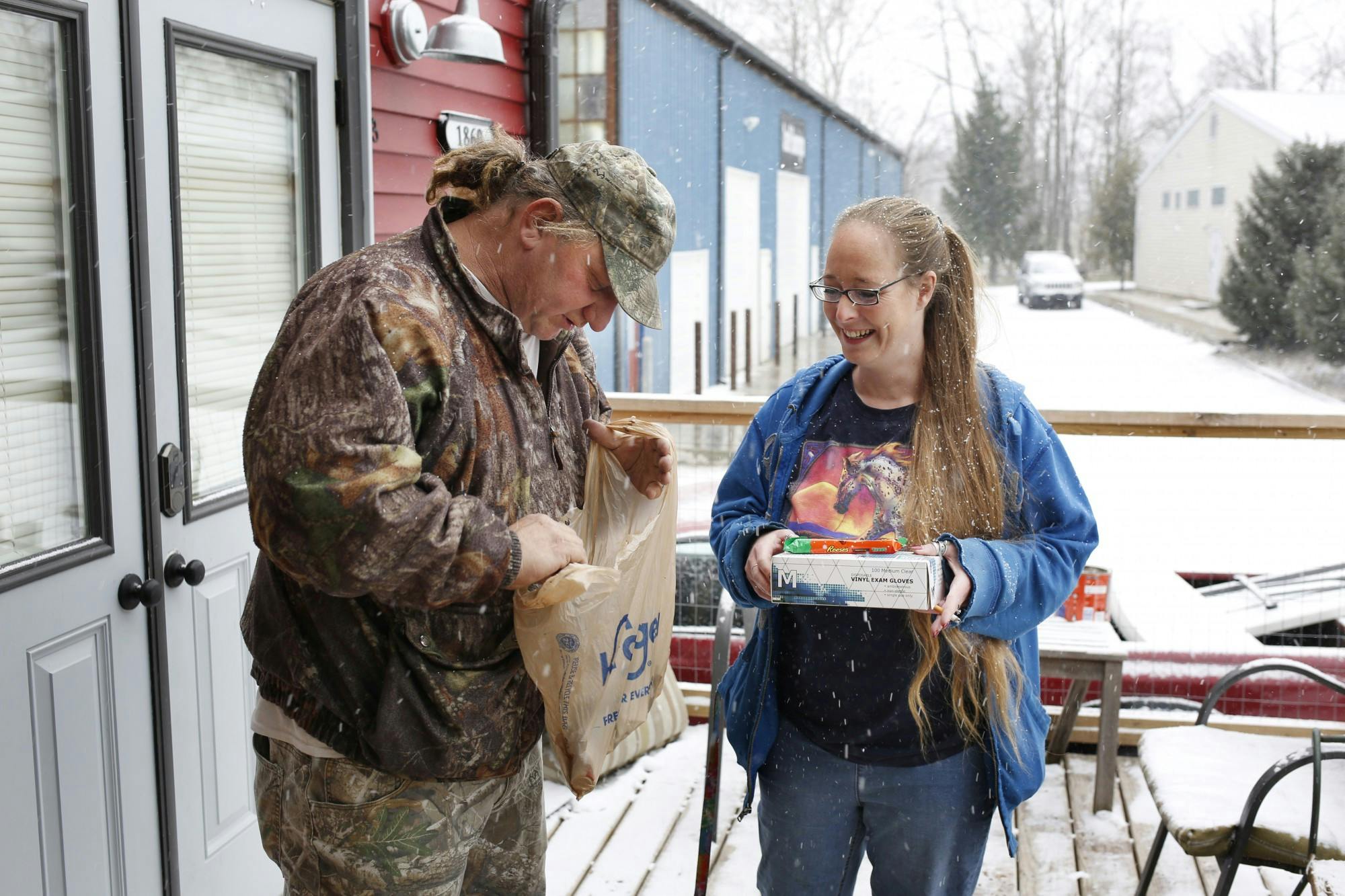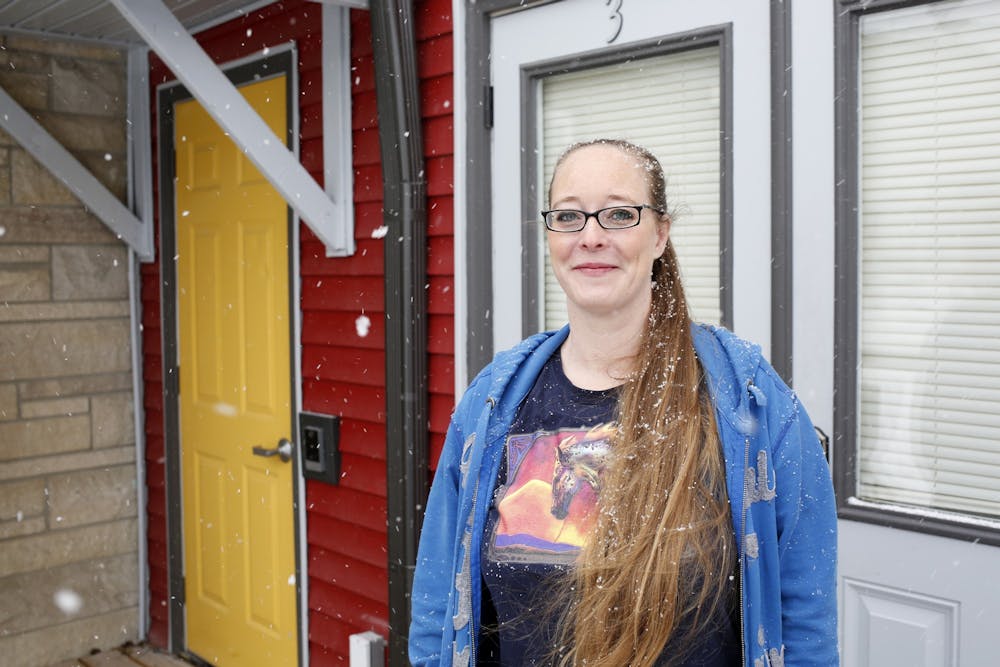Editor’s Note: This story includes mention of violence toward a child.
Just before 2 a.m. last Thursday, Katie Norris was scouring her phone, trying to piece together the location of a missing woman.
A few days before, Norris had found the woman a safe place where she could hide from the abuser she had a restraining order against. But upon calling the location, a worker said the woman hadn’t been there since she left for work the day before.
She could be anywhere. She could be with her abuser.
Norris had been in situations like this before. So she was calm, but acted fast, staying on her phone and consistently checking her messages, because she knew what was at stake.
It was going to be a long night, but Norris had already planned on staying up.
She didn’t know all of the details surrounding the situation at the time, but that didn’t matter. She was going to get that woman out of whatever situation had made her feel scared.
Norris is the executive director for the nonprofit organization Hotels for Homeless and the men’s shelter Robin & Trisha’s House. While she does dedicate the majority of her time to the two nonprofits, she considers herself a reliable resource not just to people involved in the organizations, but to those who have nowhere else to turn.
She always answers her glittery, fairy-like ringtone, which she chose to keep herself upbeat, with a calm, positive tone. She happily addresses the person on the other line as “gorgeous” or “honey” before listening as they tell her if they need food, a place to stay or clothes. She often donates her own money to both of her programs, especially when people need an emergency hotel room through Hotels for Homeless. She stays up until 2 a.m. most nights, just in case someone needs her, and to complete any work she didn't do during the day, such as writing out to-do lists and filling out forms.
“It’s easier to stay up for the emergencies than to wake up to emergencies,” Norris said.
Norris is used to being the last resort, the person who will help when no one else will. So, it’s rare when she refuses to help someone or put them on a waitlist for one of the two nonprofits she founded.
Hotels for Homeless is a 501(c)(3) nonprofit that pays for hotel rooms, either for an extended period of time or for one night, for Monroe County residents who are unhoused. The organization’s volunteers also assist with casework for those in the long-term program.
Robin & Trisha’s House was established May 2021 through a partnership between Hotels for Homeless and Bloomington Homeless Coalition, which is no longer involved in the organization. The shelter, named after Norris’s mom and the other founder of Hotels for Homeless’ mom, serves as transitional housing for sober men.
The two organizations have helped more than 130 people find long-term stable housing, said Kelsie Shields, Hotels for Homeless vice president and Robin & Trisha’s director of operations.
Norris started Hotels for Homeless almost two years ago when she herself only had $20 left from her previous paycheck. A family member, who had been staying at a shelter that had filled up that day, asked if she and her daughter could stay with Norris. Not wanting to possibly expose her kids to COVID-19, Norris contacted multiple shelters around Monroe County and, finding none, reached out to her dad, uncle and grandma. The four of them pooled their resources and paid for the woman and her family to stay at a Super 8 for 16 days.
On the last day, because the family was able to save their money, they signed a lease for an apartment.
Two days after helping her family member, Norris saw a man’s post on Facebook saying he also needed a place to stay. So Norris donated $10 of her remaining money and put up a post on Facebook to raise more. Before she went to sleep that night, she had raised enough money for six nights in a hotel.
That’s when she realized that putting people into hotels was not just a solution for a unique situation, but something that could help many people. She named her endeavor Hotels for Homeless and a few months later New Leaf-New Life, a nonprofit which helps incarcerated or formerly incarcerated individuals transition back into the community, became the fiscal sponsor of the organization. Since then, Hotels for Homeless has raised about three-quarters of a million dollars to fund both emergency housing, for situations such as when the weather is below freezing, and the long-term program.
The latter program houses individuals in hotels and helps them with casework until they find a place of their own. Five groups are in the program now. The groups, which can consist of one person, a couple or a family, and all currently have long-term stable housing lined up after their move out date.
Jace Ryan Sallee, 28, spent about two months in a hotel room before moving into an apartment of his own on Dec. 31, 2021. Sallee, a transgender man, has struggled with homelessness since 2012, due in part to discrimination and mental and physical disabilities.

In 2015, he qualified for total permanent disability, which is a determination indicating a person can’t work due to injuries, following a series of wounds and surgeries which started in high school. In 2017, Jace was in a car crash that broke six of his ribs, lacerated his liver, detached and shattered his knee cap, gave him a concussion and broke two legs, two ankles, his right wrist and his neck.
Sallee said he reached out to Norris through the Hotels for Homeless Facebook page. As the two messaged back and forth, Sallee said he could hear Norris’s compassion in her texts and that he immediately felt he could trust her. She didn’t judge, only listened and understood. She made him feel stronger.
Both Hotels for Homeless and Robin & Trisha’s House are low-barrier organizations, which means they don’t have many requirements to access their services, though the latter does have a higher barrier as a shelter. Some of the requirements to live at the shelter include having an income, being able to pay the $450 rent, being sober and not being a registered sex offender.
With Hotels for Homeless, because the organization pays for the entirety of the room and people are able to live separately, Norris said the only requirement to get on the waitlist or stay in an emergency hotel room is to not have a place to live or sleep for the night. She said when people reach out to be put on the waitlist for Hotels for Homeless, she will avoid looking into their past, including their criminal history, to prevent her personal feelings from affecting her ability to help someone out of the cold.
But last year, Norris turned a few people away, including the first person denied from Robin & Trisha’s House.
Recently after Robin & Trisha’s had opened a paralegal, or legal assistant, from the public defender’s office reached out to her, asking if one of their clients could be put on the waitlist. At first, she didn’t hesitate and started adding him to the list, but then the paralegal said his name: Dakota King.
An article from The Herald-Times flashed in the back of her mind. The story said King had been charged with killing his then girlfriend’s two-month-old baby Braylon Elijah Lee Mosher, and, citing a Bloomington Police Department news release, said King had admitted to pushing the baby’s face into a pillow until the child stopped crying.
Norris told the paralegal she had to hang up and, after a night of rereading the article and crying, called and said she couldn’t help him. Norris said he would have been in danger at the shelter if the other men found out what he was charged with, and that in turn would have put the men in the shelter at risk of getting a criminal charge themselves.
Since the first request to help King in 2021, she had immediately dismissed any other requests to help him. But Jan. 26 was different.
Public defender Phyllis Emerick had called early in the afternoon, asking if Norris could help King find a house. At first, Norris said no, but then Norris heard the desperation in the public defender’s voice as she said their time was out to find King a place to live.
On April 27, 2021, a plea agreement was made in which King would plead guilty to neglect of a dependent resulting in bodily injury, according to a Herald-Times article. This meant his sentence would be reduced and, if he could find a place to live, the remainder of his sentence would be served in house arrest instead of in prison.
But, as of the day before his hearing, he still hadn’t found a place.
Out of respect for Emerick, Norris gave her 10 minutes, the rest of her drive home, to persuade her to reconsider.
By the time Norris arrived home, she was convinced that what she had read in the original articles was not true and she told Emerick that she would consider helping out. But she needed more information before making her final decision. So Emerick sent over a deposition, an interview between her and the baby’s mother, Anastasia Mosher. Norris spent every free minute reading and rereading that document that day.
As Norris scrolled through the more than 100-page deposition, her mind bounced around, debating what she should do. Since she had read that initial article, she had turned King away multiple times. She had been convinced he was guilty of murder. But now she had doubts.
Mosher’s account in the interview made Norris believe the baby had not been murdered but had died of sudden infant death syndrome, which is the unexplained death of an infant that usually occurs during sleep.
As she read, Norris thought about her own three boys and how much she checked on them as babies. She said she has peeked into their rooms a few more times each night since reading the deposition.
Norris closed out of the deposition at about 1 a.m. Then she got the call about the missing woman and she snapped into emergency mode. Her final decision on King would have to wait.
“I need an address of where you are,” Norris texted the woman at about 2 a.m.
Norris didn’t know if the woman’s texts were describing who she was with, her location in Bloomington or what she saw from her point of view. But then, one word the woman had repeated several times caught Norris’s eye: Stansifer.
So thinking she at least had a lead, she called 911. Within the first few minutes, Norris helped the dispatcher easily identify “Stansifer” as Stansifer Lane, and followed other texts to locate the woman. By the end of the call, the operator said she thought the police had found the woman in a house.
Over the next hour, Norris spent time on and off of calls with the dispatcher while also texting the woman, who was scared both of the police and the fact that a female officer wasn’t originally at the scene. At one point Norris tried to convince the dispatcher to order the officers to knock down the door because the woman was scared to walk outside. However, she was reminded by the dispatcher multiple times that was not legal.
Eventually, after a female emergency medical technician was called to the scene, the woman walked out. Norris got a call from the police a few minutes later that she was safe with them.
Now, at about 3 a.m., Norris was ready for bed and thought her night was over.
But then she got a call from Best Value Inn. They had called the police because there was yelling coming from one of the Hotels for Homeless rooms. This was a simple fix — a quick call to the room to identify the problem and an eventual follow-up from the people in the room. Then, finally, Norris fell asleep.
It was 4:30 a.m.
Norris has been homeless two times in her life, once with kids and once without.
She knows what it feels like to have to stand with a sign until gathering enough money for diapers. To have to wake up on a holiday in a shelter. To have to ask other people for help, and for those people to help connect her with life-saving resources.
Now she does the same for others. And in 2020, 10 years after she woke up on Christmas Eve with two babies in a shelter, she helped house about 100 people in hotels on Christmas Eve.
Norris and other volunteers at Hotels for Homeless often donate their own money to get people into rooms. Norris has donated so much that January she was behind on her own rent and utilities.
“We don’t let people die because of money,” Norris said.
Paying it forward is a big part of Norris’s life and she encourages everyone in her programs to do so for each other. Men in Robin & Trisha’s House sometimes write out a way they helped someone on a Post-it Note and stick it to a wall in the conference room.
“I fixed my friend’s Wi-Fi box.”
“Gave someone a table.”
“I gave good advice to my nephew.”
Norris has seen how giving back to her community, and fostering a community of support, has helped change and save lives.

While she typically gives love and assistance freely, there are a few cases in which she thinks a bit harder because she doesn’t want to make a mistake that would lead to bigger negative consequences. King’s case was one of them.
Emerick called Norris at 5:13 p.m. Jan. 27. Norris had read the deposition related to King’s case, and at this point was almost convinced that she personally, not through Hotels for Homeless or Robin & Trisha’s House, would be willing to help King. But she wanted to talk to Emerick again, specifically to ask one question: had King admitted to murder?
Emerick said he had not. She also said it was possible, based on the autopsy, the baby could have died of natural causes.
Emerick didn’t hand over any documents to prove her statements, but based on what Norris had read in the deposition, Norris believed her. However, Norris knew that if she found contradictory information, she would immediately step away.
But, at that moment, Norris committed to helping King find a place to live.
She didn’t want to meet him or work with him directly. She didn’t want him to be involved in her life anymore than he already is. She wanted boundaries.
However, like in many other situations in her life, she knows she is the last resort and she wants to help.




